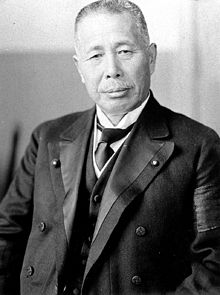Tanaka Giichi
Danshaku Tanaka Giichi ( Japanese 田中 義 一 ; born June 22, 1863 in Hagi , Chōshū , Nagato Province (today: Yamaguchi Prefecture ), Japan ; † September 29, 1929 in Tokyo ) was a Japanese general , politician and the 26th Prime Minister of Japan .
biography
Promotion to general and minister of war
Tanaka entered military service and graduated from Army College . As a protégé of the two-time Prime Minister and Field Marshal General ( Gensui ) Yamagata Aritomo , he was promoted quickly and was most recently director of the Bureau of Military Affairs from 1910 to 1913.
From September 1918 to June 1921 he was Minister of the Army in the Hara cabinet . As such, he was initially a staunch advocate of the Japanese intervention in Siberia against the new regime of the CPSU in the Soviet Union . He saw himself as a proponent of the expansion of the Japanese Empire to Siberia and repeatedly pushed through the deployment and stationing of military units of the Imperial Japanese Army with his military allies , while other countries were already withdrawing their army units. For his services he was promoted to Rikugun-taishō ( General ) in 1920 and raised as Danshaku ( Baron ) Tanaka to the nobility ( Kazoku ). Because of his attitude during the Siberian intervention, he was also one of the most criticized ministers of the time. Between August and September 1923 he was Minister of the Army in the second cabinet of General Count Yamamoto Gonnohyōe .
In 1925 he retired from active military service and was elected President of the Rikken Seiyūkai (Friends of the Constitutional Government), the most influential party in Japan at the time, which has since been considered closely associated with the military.
Prime Minister 1927 to 1929
On April 20, 1927, despite allegations of misappropriation of army funds, he became Prime Minister and took over the post of Foreign Minister in his government, which was in office until July 2, 1929 . From June 1929 he was also a minister in the newly established Colonial Ministry .
After his election as Prime Minister, the voice of the expansionists could be heard in the leadership of Japan, who pleaded for the establishment of a more extensive area of influence, new sales areas for domestic industries and thus the conquest of further colonies .
As Prime Minister, he promoted the death penalty for revolutionaries and subversive forces through the Law for the Maintenance of Public Security . His “hard hand” policy towards China has earned him sharp criticism both at home and abroad.
In 1928 he intervened against the advance of Chiang Kai-shek's northern campaign , which led to the occupation of Jinan . Hardliners from the officer corps murdered Japanese-sponsored warlord Zhang Zuolin in an attack in June 1928. In the following investigation, details leaked to the public and the perpetrators of the conspiracy were publicly identified in newspapers. Tanaka tried to get the authors to be punished, but failed due to the resistance of the army, which interfered in the government's foreign policy. Tanaka resigned on July 2, 1929 in the wake of the scandal.
During his term of office, the seat of government ( Kantei ) was completed in 1929.
family
Tanaka's eldest son Tatsuo was Governor of Yamaguchi after the war, Liberal Democratic MP and Minister on several occasions. Tanaka's son-in-law Ozawa Tarō was governor of Yamaguchi, a liberal-democratic member of the lower house and upper house, his grandson Ozawa Katsusuke was a socialist member of the lower house and the defeated candidate for governor in Yamaguchi in the 1996 election.
Web links
- rulers.org
- Newspaper article about Tanaka Giichi in the press kit of the 20th century of the ZBW - Leibniz Information Center for Economics .
Individual evidence
- ↑ Harukat Takenaka: Failed Democratization in Prewar Japan. Stanford University Press 2014, p. 205.
- ^ Edward J. Drea: Japan's Imperial Army. Lawrence, 2009, pp. 163-166
| personal data | |
|---|---|
| SURNAME | Tanaka Giichi |
| ALTERNATIVE NAMES | 田中 義 一 (Japanese) |
| BRIEF DESCRIPTION | 26. Prime Minister of Japan |
| DATE OF BIRTH | June 22, 1863 |
| PLACE OF BIRTH | Hagi , Nagato Province , Japan |
| DATE OF DEATH | September 29, 1929 |
| Place of death | Tokyo |
